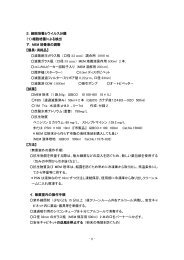Program and Abstracts(PDF)
Program and Abstracts(PDF)
Program and Abstracts(PDF)
You also want an ePaper? Increase the reach of your titles
YUMPU automatically turns print PDFs into web optimized ePapers that Google loves.
Presentation 6<br />
OVERCOMING TECHNICAL BARRIERS TO THE SUSTAINABLE DEVELOPMENT<br />
OF COMPETITIVE MARINE AQUACULTURE IN THE UNITED STATES<br />
John A. Hargreaves<br />
Aquaculture Assessments LLC, Baton Rouge, LA, USA<br />
Email: jhargreaves01 at yahoo.com<br />
Technological innovation drives economic growth <strong>and</strong> development <strong>and</strong> is a key component of<br />
competitive advantage in a global economy, but innovation can be impeded by unresolved<br />
measurement barriers. Overcoming measurement barriers requires the development of methods,<br />
st<strong>and</strong>ards, instruments, <strong>and</strong> capabilities to evaluate the performance <strong>and</strong> advancement of<br />
technologies. A workshop was held to identify the priority research needs, <strong>and</strong> where appropriate,<br />
the measurement barriers that impede innovation in U.S. marine aquaculture. The workshop<br />
focused on the critical technology gaps that affect the sustainable development of a commercial<br />
marine aquaculture sector emphasizing four types of production systems: shellfish aquaculture,<br />
cage culture of marine finfish, l<strong>and</strong>-based culture of marine finfish, <strong>and</strong> biofloc-based culture of<br />
marine shrimp.<br />
The main subject areas with identifiable technology gaps include: genetic improvement,<br />
nutrition, health management, control of reproduction, production of larvae <strong>and</strong> juveniles, food<br />
safety <strong>and</strong> product quality, environmental performance <strong>and</strong> impact, system engineering <strong>and</strong> lifesupport<br />
systems, <strong>and</strong> economics <strong>and</strong> marketing.<br />
Technical barriers to innovation can be addressed by strategic investment in high priority<br />
areas, particularly those with potential benefits that extend across technology platforms, <strong>and</strong><br />
those that integrate research among subject areas. Also, cost-effective investments in research to<br />
address high-priority information <strong>and</strong> technology needs, combined with a stable regulatory<br />
environment, a streamlined permitting process, <strong>and</strong> public-private partnerships in demonstration<br />
systems can accelerate private-sector investment in the development of a sustainable <strong>and</strong><br />
competitive marine aquaculture sector in the U.S. economy.<br />
Research needs are summarized <strong>and</strong> prioritized. Specific measurement gaps are also<br />
described. Important non-technical barriers to sector development are also identified. Roadmap<br />
implementation focuses on the next steps to promote the advancement of US marine aquaculture.<br />
14



